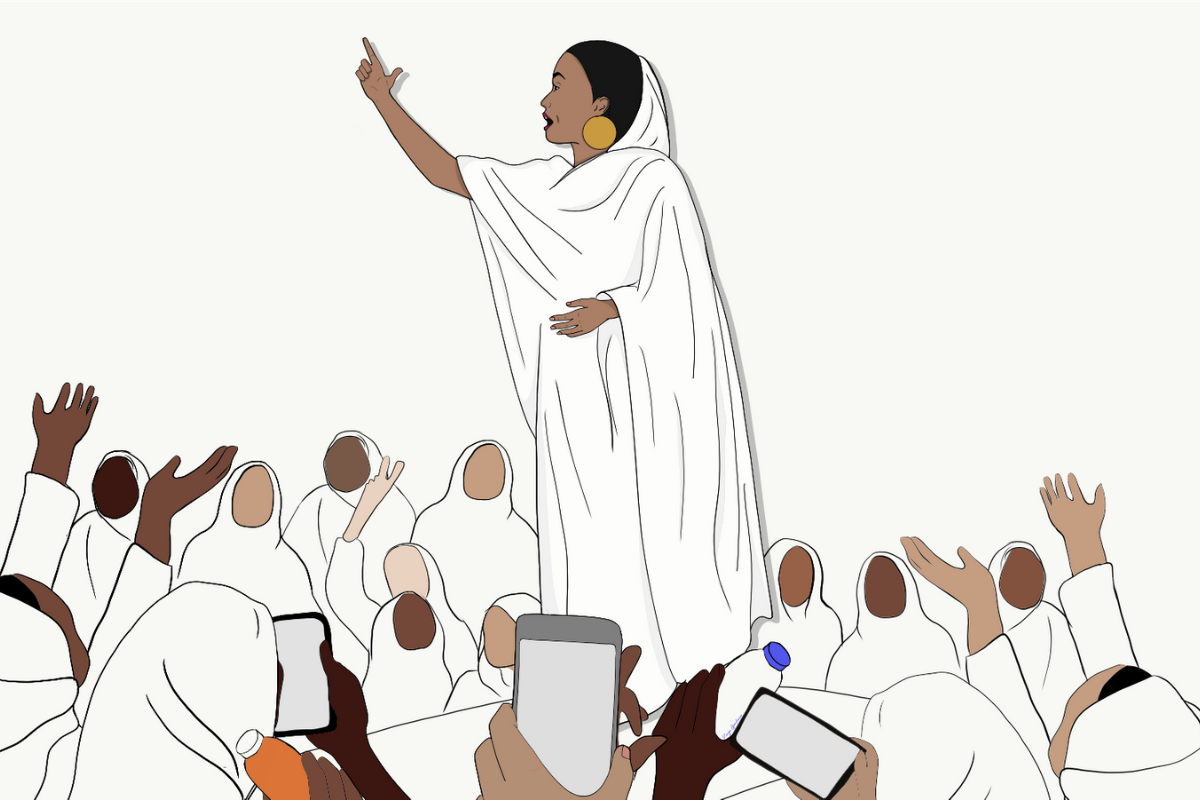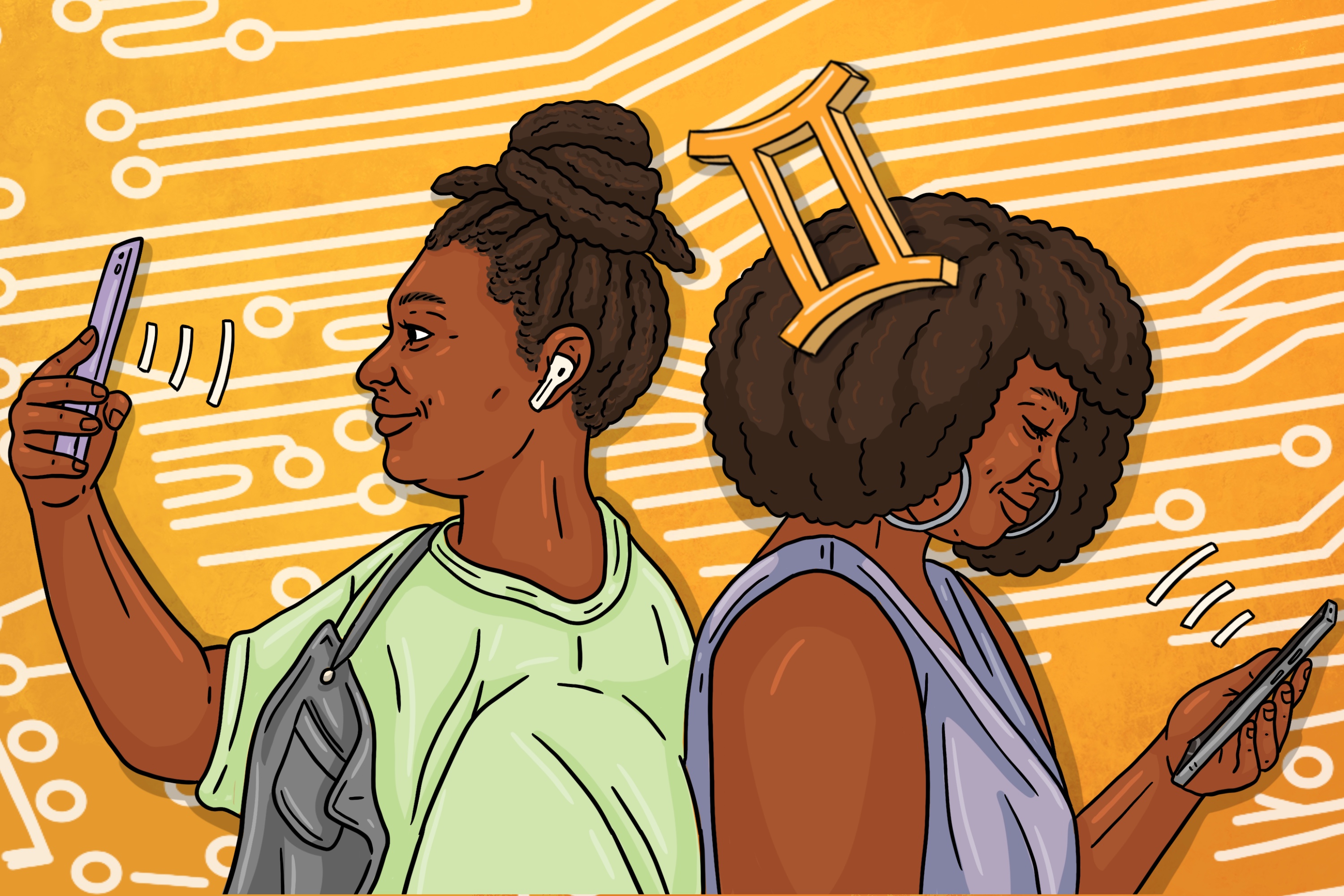
Illustration by Parys Gardener
For the Sudanese diaspora, the past six months have been a period of emotional turmoil. Being so far away from our homeland has left us feeling helpless and guilty for enjoying freedoms that the family we left behind have not had access to for at least thirty years. Now-deposed president Omar al-Bashir and his regime pushed out our families many decades ago; Bashir and his regime are the reason our spoken tongue is a foreign one and our mother tongue is buried deep within.
Bashir and his regime are the reason our parents had to live in isolation, struggling to fit in, but always striving to ensure a better life for their children. My parents went to English classes, built ties with neighbours, and tuned into Eastenders every evening. Life in the diaspora means long periods of getting along and getting by, sometimes disturbed by a phone call to let us know that yet another loved one has passed while we are miles away. The distance feels insurmountable in these moments and the pain, immeasurable.
3,500 miles away, six months in, two presidents down, and after significant bloodshed the fight in Sudan still continues. From mass protests against emergency austerity measures and the plummeting value of the currency, to a large sit in across the entire country, the citizens stand strong insisting that they will not cease until they achieve the result they want. Burning teargas, live ammunition, brutality, and imprisonment has not stopped men, women and children calling for the TMC (the Transitional Military Council) to hand power over to a civilian government.
“So long after the Arab spring, the world is now eagerly watching and waiting to see if protestors in Sudan will succeed in their mission”
The Sudanese revolution has quite clearly shaken both Sudan and the world. So long after the Arab spring that sprung in many neighbouring countries, the world is now eagerly watching and waiting to see if protestors in Sudan will succeed in their mission. Some commentators have expressed pessimism about the outcome of the protests, considering how events have played out in countries like Egypt, which is now governed by military dictator Abdel Fattah el-Sisi, whose leadership led to the killing of over 800 protesters in the 2013 Rabaa Massacre. Even though the first hurdle has been achieved and Bashir has been removed by a military coup, as well as his successor, coup-leader Ibn Auf, a feeling of uneasiness continues to echo over much of North Africa. However, many of the protestors remain positive, and sure that the Nile spring, as they have named it, will not follow in the footsteps of the Arab Spring.
After the sanctions placed on Sudan by the US, which blocked access to loans from the International Monetary Fund (IMF), and the division between North and South Sudan which saw South Sudan gain independence and take with it the majority of the country’s oil, Sudan’s economy has heavily struggled. People were unable to afford basic necessities such as bread and were left standing in ATM queues for hours on end, only to be told there was no cash to withdraw. These circumstances set the scene for the revolution.
Six months later, and millions gather every day in the holy month of Ramadan under scorching heat to sit in at the military headquarters in Khartoum. The sit in is buzzing with good vibes, music, and elaborate murals; in the face of uncertainty, the citizens use artistic forms to express their struggle and the future they are fighting for.
“The revolution lives in the heartbeat of each individual in the Sudanese diaspora”
However, the Sudanese revolution is not just contained to the streets of Khartoum: its spirit has poured out into the rest of the world. The revolution lives in the heartbeat of each individual in the Sudanese diaspora. Our hearts beat to the chants we so attentively listen to and watch through our screens; our one and only connection to our people, our homeland.
Communities all across the world rallied together to collect money to send to Sudan, so that protestors seeking to hold their government to account can buy water, tea, food and snacks. Back in Khartoum, with still no access to their cash, the sit-ins are filled with free food, drinks, bus rides, mobile phone credit. “It is impossible to enter the sit-in, without leaving with something,” explains Saeed Abash, one of the protestors. “Sudanese people have always prided themselves on hospitality. But in this case, we have really outdone ourselves”. These donations enable bus drivers to take people home after a night at the sit-in without charging them. This money also enables shops to distribute phone credit so people can call their loved ones without charge. This money is being used to set up air-conditioned tents for the protesters to seek shelter while fasting.
It is not the work of governments or charities, but rather individuals who are emotionally connected to the revolution putting their minds together to bear some of the responsibility of building a better future. Many people in the Sudanese diaspora left Sudan in order to build a better future for themselves and their families, as well as to also one day be able to help our country. Now that chance has come, and we won’t let this opportunity pass us by.
This revolution is for all of us. The diaspora and those in Sudan are living as one body. They are hurting, and we feel that pain. If we feel it we must act on it, and we have, and we will continue doing so. We don’t need $3bn cash injections from Saudi Arabia, we are crowd-sourcing a revolution built on community and solidarity. Sudanese people on the ground are paying the price of a better future with their blood, the least we can do is cover the rest.









